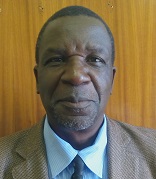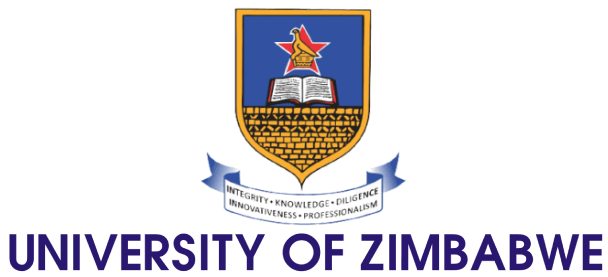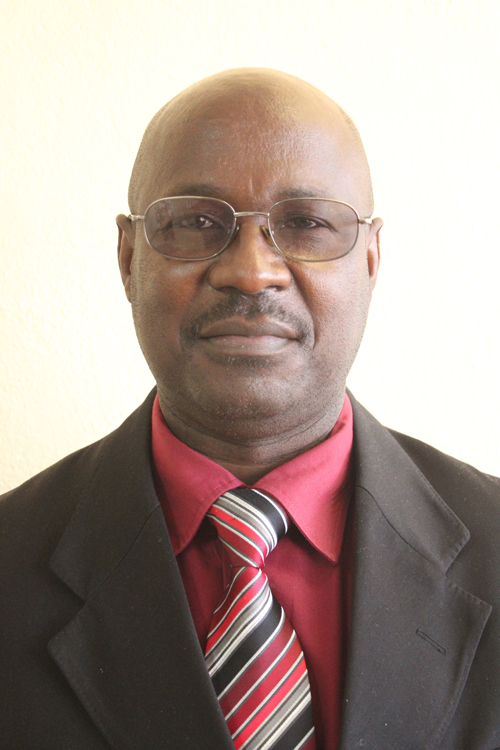Senior Lecturer

Dr Francis Muchenje
D.Ed. (UNISA) M.Ed. (UZ) B. (UZ) C.E. (Mutare Teachers’ College UZ) Dip. Trg. Mgmt. (IPMZ)
Email: This email address is being protected from spambots. You need JavaScript enabled to view it.
Research interests: Multicultural education, Gender and education, Indigenous Knowledge Systems , Education and development, Education and social inequality, Sociological theory,,Multicultural Education,Social inequality and Education,,Sociology of Development.
Publications
Book Chapters
- Muchenje, F. (2013). Sociological theory and curriculum reform in Africa: The challenges. In Chemhuru, O. (Ed.) (2013). Issues in Foundations of Education (pp. 73-89). Gweru: Booklove Publishers. ISBN 978-0-7974-5229-9.
- Muchenje, F. (2013). Making the invisible visible: A sociological analysis of issues in multicultural education for Africa. In Chemhuru, O. (Ed.) (2013). Issues in Foundations of Education (pp. 73-89). Gweru: Booklove Publishers ISBN 9780797452299.
- Muchenje, F. (2013). Wastage discourse in education: Towards an agenda of action. In Shizha, E. (Ed.) (2013). Restoring the educational dream: Rethinking educational transformation in Zimbabwe (pp. 76-95). Pretoria: Africa Institute of South Africa ISBN 978-0-7983-0407-8
- Muchenje, F. (2014). Social stratification and social mobility. Theory of Education (pp 280-310) Diploma in Education: Open and Distance Learning. University of Zimbabwe Harare: Department of Teacher Education. ISBN 978- 1- 77920-065-5
- Muchenje, F. (2014). Deviance. Theory of Education (pp. 311-341)Diploma in Education: Open and Distance Learning. University of Zimbabwe Harare: Department of Teacher Education. ISBN 978- 1- 77920-065-5
- Muchenje, F. (2014). Contemporary social problems and Education. Theory of Education (342-382) Diploma in Education: Open and Distance Learning. University of Zimbabwe Harare: Department of Teacher Education. ISBN 978- 1- 77920-065-5
- Muchenje, F., Gora, Ruth and Makuvaza, N. (2016). Interrogating the concept of time among the Shona: A postcolonial discourse. In Emeagwali, G. and Shizha, E. (Eds.) (2016). African Indigenous Knowledge and the sciences: Journeys into the present and past. (pp. 79-92). Rotterdam: Sense Publishers,
- Muchenje, F. (2017) Cognitive justice and Indigenous Knowledge Systems in the postcolonial classroom. In Shizha, E. & Makuvaza, N. (Eds.) Rethinking postcolonial education in Sub Saharan Africa in the 21st Century: Post Millennium Development Goals (pp. 69-84). Rotterdam: Sense Publishers. ISBN978-94-6300-960-7
- Rwodzi, M., Gotosa, K. & Muchenje, F. (2018). Advocacy for Carl Rogers’ humanistic perspective for post-colonial classroom practice in Zimbabwean schools: A focus on learner identity, development and the language of instruction. In F. Machingura and T. Chataika (Eds.) The intersection of ubuntu, education and ethics in Zimbabwe (pp. 66-76). Harare: University of Zimbabwe Publications. ISBN 978-0-7974-8428-3
Paper/ Article Publications
- Bondai, B. and Muchenje, F. Teachers’ Coping Strategies in Financial Difficulties: A Case Study of the ‘Classroom Tuck shop’ Phenomenon in Zimbabwean Urban Primary Schools in Norton’ Zimbabwe Journal for Educational Research Volume 20, Number 3, November 2008 ( pp. 261-279)
- Muchenje, F. Multicultural Education in Zimbabwean Primary Schools: An Agenda of Issues. Zimbabwe Bulletin of Teacher Education. Volume 14 (2) May 2008 (pp. 7-21)
- Goronga, P., Muchenje, F. and Bondai, B. The Impact Of Teachers’ Incentives In Boosting Morale In Zimbabwean Primary Schools: A Case Study Of Selected Schools In Chinhoyi Urban. Zimbabwe Journal Of Educational Research Volume 23 Number 2 July 2011 (pp 170-185).
- Rwodzi, M., Muchenje, F. and Bondai, B. Student Teacher Perceptions of the Role of Classroom Mentors on Attachment Teaching Practice: The Case at Morgan ZINTEC College. Zimbabwe Journal Of Educational Research Volume 23 Number3, November 2011 pp 236-258.
- Bondai, B., Gora, R. and Muchenje, F. Language and Gender: Implications on the Development of Female Self Concept in Zimbabwe. Zimbabwe Journal Of Educational Research Volume 24 Number 1 March 2012 pp13-24.
- Muchenje, F. (2012) A comparative analysis of the causes of primary school dropout in an urban and commercial farm setting in Norton area. Zimbabwe Journal of Educational Research Volume 24 (3) pp 322-328.
- Muchenje, F. (2012). Cultural Pluralism And The Quest For Nation Building In Africa: The Rationale For Multicultural Education. Journal For Sustainable Development In Africa Volume 14 (4) pp 70-81.
- Muchenje, F., Goronga, P. and Bondai, B. (2013) Zimbabwe’s language policy in education and the ‘ silenced voices’: A case study of Nyanja/ Chewa speaking pupils from Porta and Kintyre primary schools in Zvimba, Zimbabwe. Academic Research Volume 4 (2) pp 500-511.
- Muchenje, F., Gora, R. and Bondai, B. (2013). Constraints of private sphere responsibilities on availability of time to study: A case study of married women students at the University of Zimbabwe’s Faculty of Education. Academic Research International. Volume 4 (3) pp 513-525.
- Goronga, P., Dozva, M. and Muchenje, F. (2013). Teacher perceptions of triple-shift schooling system: A case study of Chikonohono primary school in Chinhoyi urban. International Journal of Social Science and Education. Volume 3 (4) pp 917-927.
- Muchenje, F. and Goronga, P. (2013). Education and the revitalization of indigenous knowledge systems in Africa: A paradigm shift in curriculum content. International Journal of Social Science and Education. Volume 3 (4) pp 886-894.
- Muchenje, F. and Heeralal, P.J.H. (2014). Teachers’ perceptions of the implementation of multicultural education in primary schools in Chegutu District, Zimbabwe. Journal of Social Science. Volume 41 (3) pp325-333.
- Muchenje, F. and Goronga, P. (2015) Developing strategies for the promotion of Indigenous Knowledge Systems in Africa’s Development: A perspective from the South. International Journal of Social Science and Education. Volume 5(4) 538-546.
- Muchenje, F. and Heeralal, P.J.H. (2016). Teachers’ views on the accommodation of students’ cultural diversity in curriculum instructional materials in use in primary schools in Chegutu district Zimbabwe. Journal of Social Science 47 (2), 142-150.
- Heeralal, P.J.H. and Muchenje, F. (2016). Classroom pedagogy and the accommodation of students’ cultural diversity: An analysis of teachers’ views from selected schools in Chegutu district Zimbabwe. International Journal for Innovation Education and Research 4 (10), 40-52.
- Muchenje, F. and Gora, R. (2016). Locating Zimbabwe’s language in education policy in the context of multicultural education: Perspectives of teachers from selected primary schools in the Chegutu District. NAWA Journal of Language and Communication 10 (1), 148-162.
- Moyo, S. and Muchenje, F. (2018) A case study of teachers’ perceptions of inclusive education in selected primary schools in Reigate District Bulawayo Zimbabwe. Zimbabwe Journal of Educational Research 30 (2), 218-231.
Chapters & Papers submitted and accepted for publication
- Muchenje , F and Gora , R : A synthesis of approaches to multicultural education: Implications for practice in Zimbabwean primary schools. (being reviewed for University of Zimbabwe Publications)
- Gora , R and Muchenje, F : The relevance of Indigenous Knowledge Systems in the school curriculum: Issues and perspectives from the South.(being reviewed for University of Zimbabwe Publications)
- Gora , R. and Muchenje, F. Gender patterns on WhatsApp: A socio linguistic perspective (under review by NAWA Journal of Language and Communication)


 Qualifications:
Qualifications: 